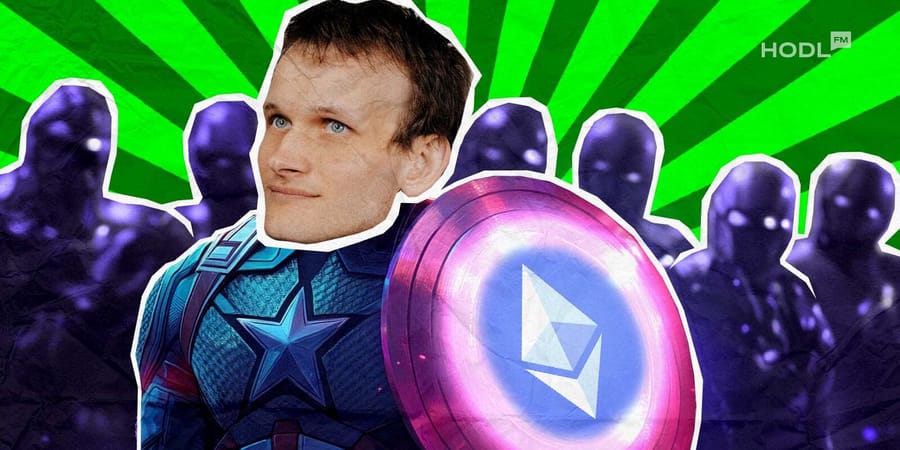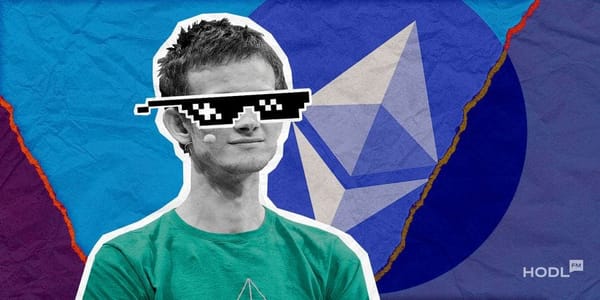At the Home Staking Summit in Singapore, Ether co-founder Vitalik Buterin shared his thoughts on solo staking and its potential to improve the Ethereum network.
During a cozy fireside chat with Singaporean TV host Samuel Chong, Buterin highlighted solo stakers' significant role in keeping Ethereum secure and decentralized. He also touched on potential Layer 1 improvements to better support their contributions.
More: Vitalik Buterin Denounces L2 Networks That Are Below Stage 1
Vitalik emphasized the dual role of solo stakers, calling them both the "first line of defense" against censorship and the "last line of defense," stopping mistaken chain confirmations at 67%. He stressed the importance of decentralization, noting that solo stakers tend to avoid affiliation with large organizations, making them less vulnerable to regulatory capture or coercion. This reinforces Ethereum's status as a solidly neutral block space.
Buterin’s X-post followed a thread by Samuel Chong, summarizing the key points about solo staking. According to Buterin, individual stakers are essential to Ethereum’s security, serving two key functions: resisting censorship and blocking quorum errors.
Some thoughts on solo staking, what realistic value solo (+ small-business and community) stakers could provide to the network, and what changes L1 can make to better support solo stakers. https://t.co/3JfELpjQBx
— vitalik.eth (@VitalikButerin) September 24, 2024
Understanding Quorum
Here’s a quick refresher for those still figuring things out. Quorum is the minimum number of network participants needed to decide which blocks or transactions are officially confirmed on the Ethereum blockchain. When the network is about to approve a new block, a certain percentage of participants must agree to confirm it. If the majority agrees that the block is legit, it’s added to the chain. In Ethereum, at least 67% of validators must approve a block to be finalized — that’s the quorum.
If someone manages to seize or bribe the majority of validators (like, more than 67%), they could try to approve a questionable blockchain. This would be a big problem because they could mess with the blockchain. Enter solo stakers, they help prevent this by blocking quorum, making it harder for the bad guys to gain enough control to finalize the chain.
So, the more independent validators we have, like solo stakers, the tougher it is for attackers to reach quorum and mess with the network.
Buterin's View on Why Solo Stakers Matter in Ethereum
Solo stakers play a significant role in ensuring secure transactions without interference or manipulation. They keep central control at bay by validating transactions on their own. Samuel Chong pointed out that Buterin's emphasis on solo stakers is vital to maintaining Ethereum’s decentralization. Their independence makes them resistant to censorship and pressure from regulators, safeguarding the network's integrity, security, and open access.
Additionally, solo stakers help protect the network from finalizing incorrect chains. If a malicious party were to gain control over 67% of validators, it would spell disaster. But solo stakers raise the quorum threshold, preventing such takeovers.
Vitalik's analogy goes something like this: Imagine a house with 10 cm thick bulletproof windows but a flimsy wooden door. You’d want to shift resources to reinforce that weak spot.
Right now, most of the security measures focus on the quorum threshold. But Buterin stressed the need to address broader vulnerabilities. He pointed out threats like backdoor attacks (think bribing core developers or paying off major node operators) which pose significant risks.
To counter this, Vitalik pushed for reallocating resources to shore up weak spots beyond the quorum. Simply put, Buterin believes that Ethereum can achieve better security by strengthening across the board, rather than over-investing in just one area.
He also highlighted the importance of increasing the number of independent stakers, making them a critical component in the final confirmation process. Vitalik explored ways Ethereum’s Layer 1 could better support and incentivize solo staking.
Industry Insight: Launchnodes' Perspective
We also asked for a comment from Rajesh Sinha, COO at Launchnodes, who shared his thoughts on the vital role of solo stakers in Ethereum's security. He emphasized:
Solo stakers serve as both the first and last line of defense for Ethereum, providing censorship resistance and acting as a crucial quorum-blocking set to prevent malicious actors from finalizing blocks.
Sinha explained that Launchnodes is fully committed to supporting the growth of solo staking, as it “ensures Ethereum remains credibly neutral and resistant to centralized influence.” He added that solo stakers, who are independent from large organizations, contribute to Ethereum's decentralized nature, making it harder for any regulatory or centralized entity to manipulate the network.
Vitalik’s analogy of security—comparing over-investment in certain areas, like thick bulletproof glass, while neglecting weak points, like a wooden door—resonates with us. Increasing the number of solo stakers directly addresses this balance, ensuring that Ethereum’s security is more evenly distributed across its network.
He also noted that “by simplifying the technical requirements and costs of solo staking, Launchnodes empowers more individuals to contribute to Ethereum's security, making the network stronger and more evenly protected.”

Disclaimer: All materials on this site are for informational purposes only. None of the material should be interpreted as investment advice. Please note that despite the nature of much of the material created and hosted on this website, HODL FM is not a financial reference resource and the opinions of authors and other contributors are their own and should not be taken as financial advice. If you require advice of this sort, HODL FM strongly recommends contacting a qualified industry professional.





